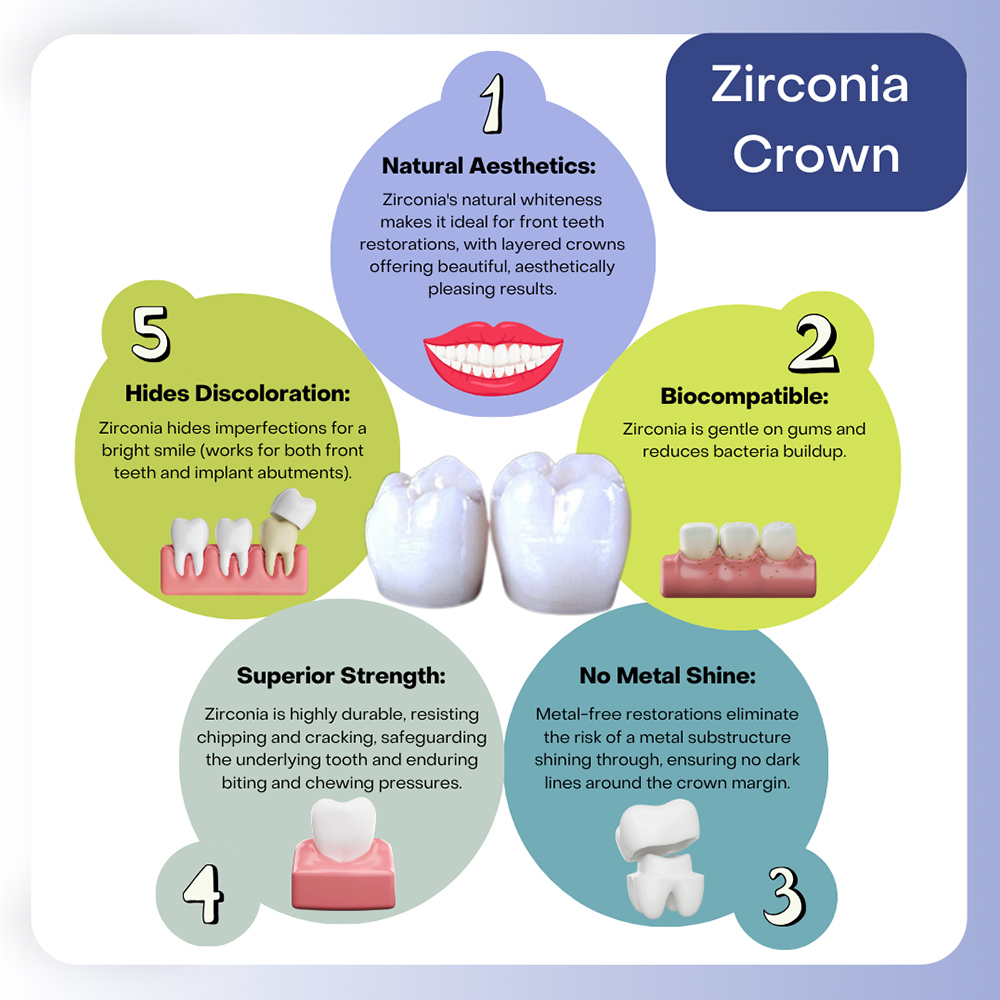Table of contents
Dental crowns are a reliable way to restore teeth that are severely decayed or fractured. They cover the entire tooth, replacing missing tooth structure, strength, and appearance. A crown can be made from many different materials, but zirconia crowns are increasingly popular.
Zirconia is one of the newer dental materials introduced over the last few decades. It is a form of ceramic, specifically zirconium oxide, and is stronger than some metal alloys and much stronger than porcelain.
A zirconia crown may be monolithic or layered. A monolithic zirconia crown is created in the finished form of the tooth, so it only needs characterizing, staining, and polishing. A layered zirconia crown has a zirconia substructure covered with porcelain specifically designed to bond to zirconia.

Zirconia dental crowns provide all the same benefits as traditional crowns. We may recommend you have a zirconia crown or another crown because of several factors outlined below.
However, zirconia can offer other benefits.
Zirconia is naturally white, making it ideal when restoring a front tooth. Layered zirconia crowns can be made from pre-shaded zirconia and then covered with porcelain to create beautiful, aesthetically pleasing restorations suitable for anywhere in the mouth. These are ideal when cosmetics are important.
Because restorations are entirely metal-free, there is no risk of a metal substructure shining through. No dark lines can appear around the margin of the crown, which can be a problem with a PFM, porcelain fused to metal crown.
The naturally white color of zirconia is opaque enough to hide a severely discolored tooth preparation underneath. It is also ideal for restoring dental implant abutments.
Zirconia is an inert material that is highly biocompatible. There is minimal risk of any sensitivities or allergies to this material. It is also kind to the surrounding gum tissue. Because it is so smooth, it makes it harder for bacteria to adhere to zirconia and easier for gums to attach around the crown.
Zirconia is far stronger and less likely to chip or crack than other dental materials like glass ceramics and composite. It’s a monolithic ceramic, meaning it is made without adding other materials. Because it is so strong, zirconia protects the tooth underneath and can easily withstand biting and chewing forces.
When choosing a suitable restoration, think about its effect on your opposing teeth. Every time you bite down or chew, these teeth could be worn down if you have a less biocompatible restoration.
This can be especially important for anyone with bruxism, where they clench and grind their teeth, subjecting them to even greater forces that can easily chip and crack them. A form of zirconia that will not harm the opposing teeth and yet has excellent strength and good aesthetics is produced especially for people with bruxism.
Although the zirconia is naturally white, it can be hard to match to real teeth, so it often needs an outer coating of porcelain specially created for these restorations. Choosing this option can provide good aesthetics, but some dentists initially found translucency to be problematic when fabricating earlier zirconia crowns due to their bone-white appearance. However, newer types of zirconia have largely addressed this issue by introducing more translucent materials.
The process for having a zirconia crown is very similar to any other crown.
Just like an ordinary crown, it usually takes a couple of weeks to complete, so after your tooth is prepared, we protect it with a temporary crown. You will need a second visit to have your crown tried in, fitted, and adjusted as necessary before it is permanently bonded in place.
Zirconia crowns are typically more expensive compared with other crowns. You may find your dental insurance covers all or part of the cost of the crown. We can provide a more accurate quotation when you visit My New Jersey Dentist.
Your new zirconia crown is easy to look after. You can brush it using an ordinary soft-bristled toothbrush and fluoride toothpaste, and you should floss around it daily. Regular dental exams and hygiene appointments allow us to check its condition regularly and clean it professionally. Your new dental crown should last for years to come with the right oral care.
If you need a new crown, zirconia is just one option available. When you visit our dental clinic, we can discuss the cost of zirconia crowns and show you samples of this material.

My name is Victoria Kushensky. I am a general dentist dedicated to remaining at the forefront of my field. Combining compassionate care with extensive knowledge, I offer cosmetic and general dentistry services as well as advanced root canal treatments.
I earned my Doctor of Dental Surgery (DDS) degree from the esteemed New York University College of Dentistry. Throughout my career, I have honed my skills in various dental procedures, ensuring effective treatment for each patient’s unique needs. I prioritize patient comfort and understanding, taking the time to thoroughly explain procedures and address any questions.
More about Dr. KushenskyMy NJ Dentist: Victoria Kushensky, DDS
385 Prospect Ave Suite 304
Hackensack, NJ 07601
(201) 298-8000